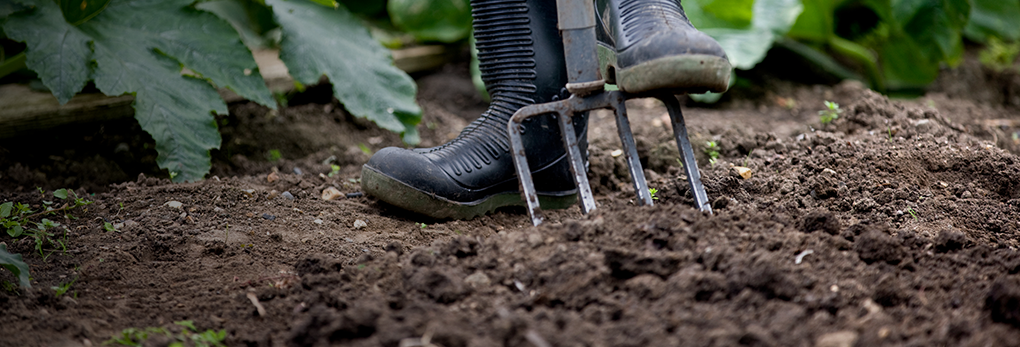
Blue Ribbon Organic Compost for Vegetable Gardens
What is Blue Ribbon Organic Compost and how can I use it in my garden?
Have you ever wondered what Blue Ribbon Organic Compost is made of? Here’s a look into the Blue Ribbon compost facility and how they make their OMRI Certified Organic Compost.
Blue Ribbon composts about six million pounds of fruits, vegetables, grass clippings and other natural materials per year in a DNR-licensed facility. The process starts with contractors and municipality workers dropping off several huge truckloads per week. Trucks arrive at Blue Ribbon with biodegradable material to recycle/compost. Brush is chipped and shredded with a huge industrial size chipper-shredder, which helps the material to compost faster. The microbial process is activated and after a short time the materials are moved to large mounds. These mounds are 10-12 feet high and hundreds of feet long.

The compost is watered, turned and absorbs oxygen for about 6 months and then tested to make sure it’s OMRI certified and ready for resale. The piles are warm because of the microbial activity - you can see the steam rising from the pile. Even in the coldest weather the piles do not freeze.
After many months of composting, the product is run through a screening process to break down “clumps” and remove debris. From the pile, it is moved with a skid steer and poured into the hopper of the bagging machine. The bagger holds the empty bag at the bottom of the hopper and the compost is measured and dispensed into the bag. Once full the bags run along a conveyor where they are heat sealed, inspected, and then stacked on the skid. The skid is picked up and delivered to Great Lakes Bio Systems!
Organic Compost not only provides a natural source of phosphorus and other vital nutrients to plants, but also restores the soil structure by adding organic matter. It is great for soil enrichment in your organic garden which yields more productive crops.
Compost works best as an additive to soil, rather than a replacement. For the best results, use compost in the range of 30% – 40% of the total soil volume.
How can I create the best potting soil mix?
A popular mix is 1/3 Blue Ribbon Organic Compost, 1/3 horticulture grade vermiculite (coarse), and 1/3 peat moss. We also recommend adding a small amount of worm castings to the mix.
Where can I find peat moss and vermiculite?
Check your local garden or home improvement store for peat moss. Vermiculite can sometimes be difficult to find locally.
Can I substitute for vermiculite?
Perlite will also work in place of vermiculite and is easier to find, but vermiculite does a better job of aerating the soil and retaining moisture. It is worth the extra effort if you can find it.
What is the pH of the compost?
Since the compost is made from recycled materials, the pH varies by batch. It ranges from 7.5 – 7.9, slightly alkaline.
The food waste is a huge part of the value in this project and tends to naturally increase the pH.
What is Blue Ribbon Organic Compost made of?
The compost is made with recycled materials including fruits, vegetables, brush, cut firewood, garden debris, grass clippings, horse bedding, leaves, sod, and wood chips.
Tested by a certified lab, the Blue-Ribbon Compost meets OMRI (Organic Materials Review Institute) standards for use in organic productions well as parameters set by the U.S. Composting Council’s Seal of Testing Assurance program.
Can I add things to Blue Ribbon Compost?
Blue Ribbon Organic Compost is derived from a wide variety of sources, but feel free to add other organic sources such as worm castings.
Wiggle Worm Earthworm Castings are high in bacteria and organic matter, total and nitrate nitrogen, exchangeable calcium and magnesium, available phosphorus and potassium.
Both products are a fantastic nutrient-rich, odor-free, natural food source for your plants. They do not burn and are safe for use at any concentration. They are both OMRI certified for organic production.
If you are looking to increase your plants growth and produce a thriving garden, then Blue Ribbon Compost is the perfect additive to use!
Buy now and save on Blue Ribbon Organic Compost today!



